

Uh oh...
It appears that you're using a severely outdated version of Safari on Windows. Many features won't work correctly, and functionality can't be guaranteed. Please try viewing this website in Edge, Mozilla, Chrome, or another modern browser. Sorry for any inconvenience this may have caused!
Read More about this safari issue.

The 2023 World Series ended November 1, with the Texas Rangers winning a decisive 5-0 victory over the Arizona Diamondbacks in Game Five. Lacking one of the marquee franchises, the Series was generally promoted as a matchup of two “underdog” teams who arrived at the Fall Classic by playing their best baseball at the right time.
Unlike the Series just completed, the opponents in the World Series of 100 years ago were not only the pre-season favorites, but they also played their regular season games in New York City, the epicenter of big-league baseball. The Giants had won the two previous World Series from the cross-town Yankees, five games to three in 1920 and four games to zero, with a tie, in 1921. Baseball historians have written extensively about the 1923 Series. It was played in the Big Apple and involved two of the most popular teams in the major leagues at the time. The 1923 World Series also featured a triumph for Babe Ruth on baseball’s biggest stage.
In the baseball history of Arkansas, the 1923 Giants vs. Yankees intercity showdown is significant in another way. The Series marked the year two young men from Ouachita Baptist College became the first Arkansans to oppose each other in America’s baseball championship.
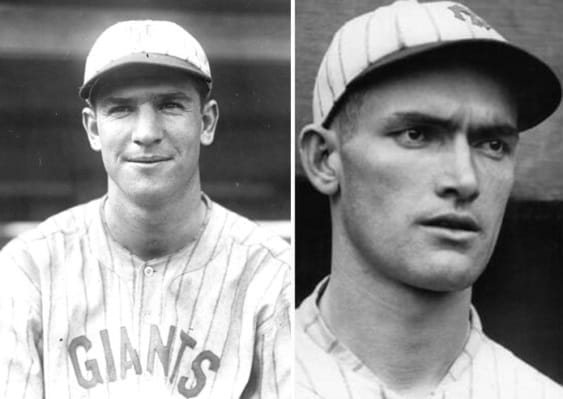
Travis Jackson and Aaron Ward
Aaron Ward, who was an outstanding football and baseball star at OBU, was a celebrity in New York before the 1923 Series. He was a 26-year-old veteran who was originally known as an excellent fielder with little chance of being a successful big-league hitter. His Little Rock manager once said, “He couldn’t hit a lick.”
By his third World Series, Ward had changed that perception drastically. He batted .417 in the Yanks’ first Series championship and according to some of his teammates, “Next to Babe Ruth, Ward is the most valuable man on our team.” Unfortunately, the player who had played the most games as Ruth’s teammate in Babe’s first five years in New York was destined for virtual obscurity even in his home state.
The other Ouachita alum in the 1923 World Series was Travis Jackson, a 19-year-old infielder from Waldo, Arkansas. Jackson batted just one time in the six-game World Series, but he was about to embark on a Hall of Fame career. Despite coming from a tiny rural town in Southeast Arkansas, Jackson was not a typical rural Arkansan.
Although Jackson had attended Ouachita Baptist College off and on since his graduation from Waldo High School in 1921, he never wore an Ouachita athletic uniform. In fact, the 1923 edition of the Oucahitonian Yearbook describes Jackson as a different type of performer.
“A real Jack of All Trades is this brain-storm who dropped in on us from Waldo. He played the hero in Peg o’ My Heart . . ., drums in the Jazz Orchestra, the manly Duke in ‘Vodville,’ and havoc with the lady’s hearts. Certainly, some man.”
Almost as an afterthought, the publication mentioned he was the shortstop for the Little Rock Travelers and about to be the same for the New York Giants.
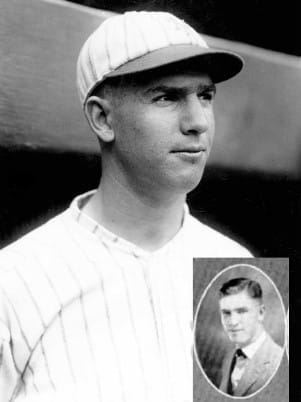
A young Travis Jackson, with yearbook photo insert
In the summer before he enrolled at OBC, Jackson was playing shortstop for a high-level semi-pro league in Warren, Arkansas, when a desperate Little Rock team signed him to finish the season filling in for a suspended infielder. He was a professional at age 17, and by the time he got that one at-bat in the 1923 World Series, Jackson had played in 99 big-league games before his twentieth birthday.
The 1924 season was Jackson’s first as a regular, and he did not disappoint. He was inconsistent at shortstop, but as a 20-year-old, he hit .302 in 151 games, his career-high for games played in a season. Once again, the Giants won a pennant and lost a World Series, this time to the Washington Senators in seven games. Jackson’s World Series was a nightmare. He hit .074 for the seven games and committed a costly error in Game Seven.
The 1925 Giants slipped to second place, and by 1926, they had fallen to the second division. Jackson had his first knee issues in 1925, missing a total of 80 games over two seasons. Despite the injuries, he hit .285 and .327 for the two campaigns, and his fielding greatly improved. Manager John McGraw was ready to make significant changes to the Giants, but Travis Jackson was untouchable.
From their days as the perennial National League champions in the first half of the 1920s until 1933, the Giants went nine seasons without a World Series appearance. During the World Series drought, Jackson’s batting average hovered near .300. He was not only the most consistent hitter on the team, but he also became one of the league’s outstanding shortstops. Sportswriters looking for a description that fit his southern heritage called Jackson the Giants’ “Stonewall.”
Hall of Fame manager John McGraw tinkered with the roster and blustered around the dugout, but he could get the Giants no higher than second place. Finally, forty games into the 1932 season, owner Charles Stoneman replaced the irascible McGraw with even-tempered Bill Terry.
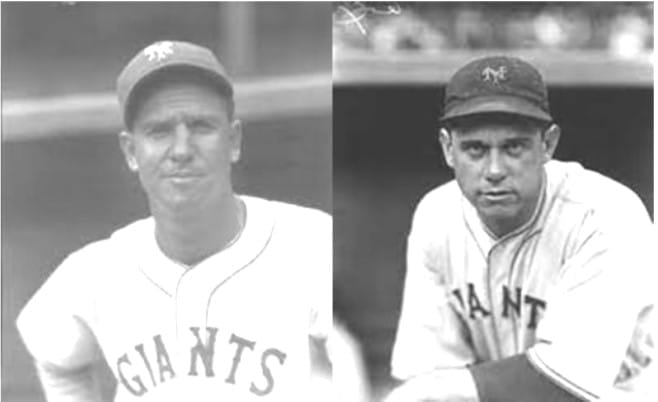
Travis Jackson and Manager Bill Terry 1933
While the Giants were repairing a malfunctioning roster under new manager Bill Terry, the Stonewall of their lineup was making a difficult decision. No longer able to ignore the handicap of two painful knees, Jackson reluctantly underwent reparative surgery on both knees prior to the 1933 season.
A rejuvenated Giants’ team won the 1933 pennant by five games, but Jackson, playing on two surgically repaired knees, was not a factor until September. On September 1, although he had played only 31 games, Bill Terry showed his confidence in his veteran shortstop by inserting Jackson into the lineup and leaving him there through the drive to the pennant and the World Series Championship over the Senators.
In 1934, with his range greatly reduced and his speed on the bases no longer part of his player personality, Jackson became a different type of hitter. After not hitting a single home run in 1933, Jackson became a middle-of-the-lineup power hitter. The inspirational leader of the Giants hit 16 home runs, drove in 101 runs, and was named the National League All-Star shortstop. He finished fourth in the voting for the league’s Most Valuable Player.
In his last two seasons, Jackson played primarily at third base. He managed to hit .301 in 1935 but fell to .230 in 1936. A shadow of the player around whom the Giants had built their teams, Travis Jackson, was released in January 1937.
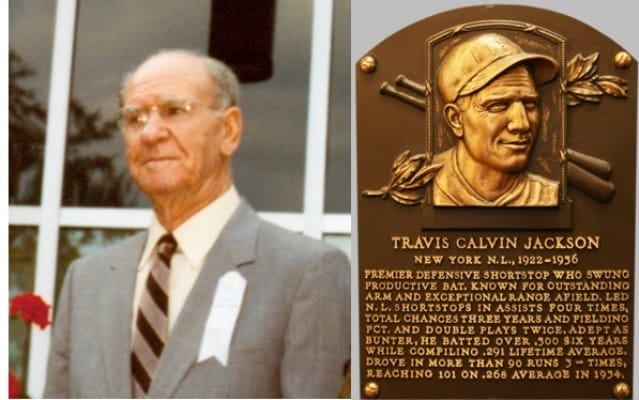
Travis Jackson at Hall of Fame induction in 1982
Jackson worked in various coaching and managing jobs for the Boston Braves organization until 1960, when he retired to Waldo for the last time. That winter, he was inducted into the Arkansas Sports Hall of Fame, an honor many thought would be his last hall-of-fame recognition. It would be another 22 years before Cooperstown called in 1982. Jackson’s alma mater, Ouachita Baptist University, inducted him into the OBU Hall of Fame in 2008.
Aaron Ward, who was the star of that World Series 100 years ago, has yet to be selected for the Ouachita Baptist University Hall of Fame or the Arkansas Sports Hall of Fame.
Join the Conversation
Leave a Comment
One response to “Travis Jackson & Aaron Ward: Ouachita to Cooperstown”
 Leave a Reply
Leave a Reply
We do the work.
You check your email.
Sign up for our weekly e-news.
Get stories sent straight to your inbox!


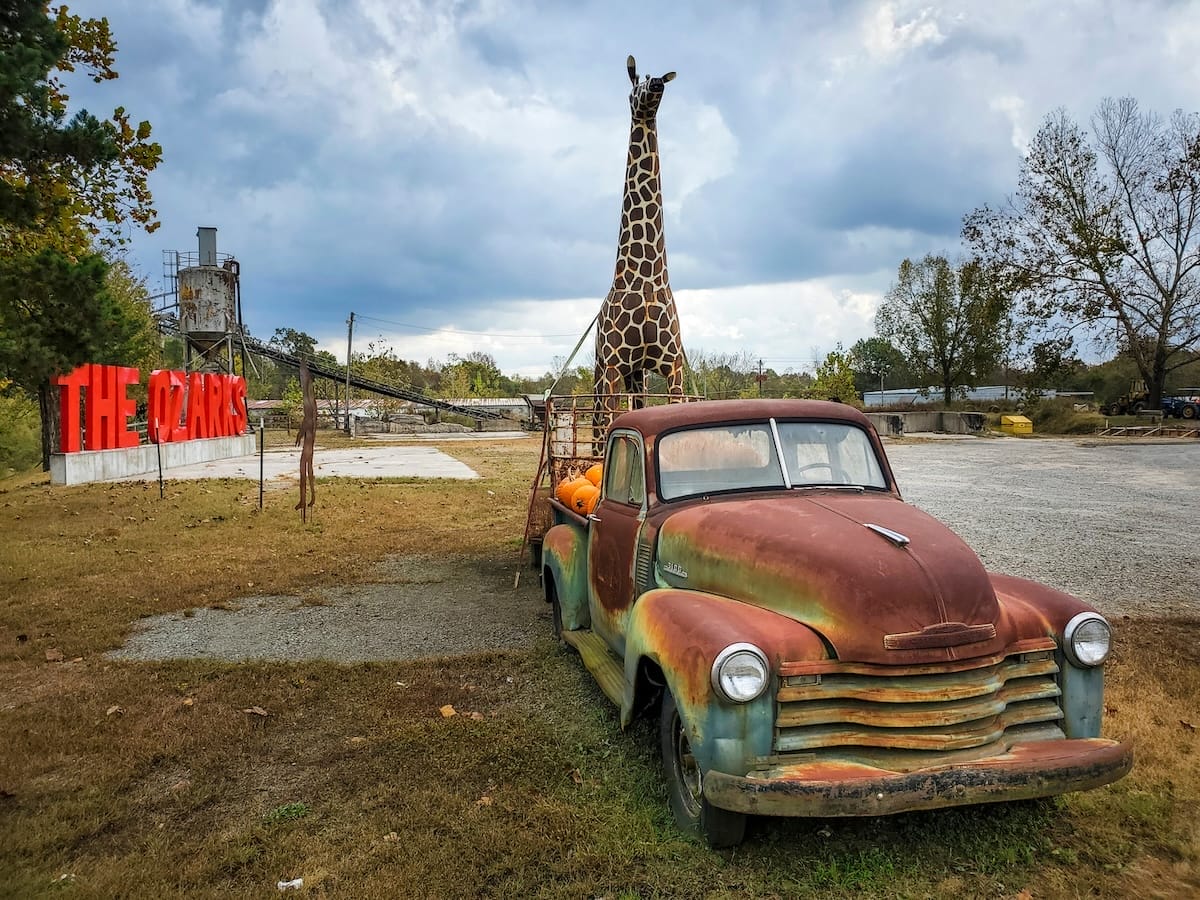









 Leave a Reply
Leave a Reply
Waldo is not in SE Arkansas